Books by Faculty Members 2015-16
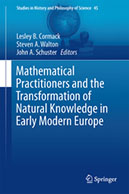 |
Mathematical Practitioners and the Transformation of Natural Knowledge in Early Modern Europe This book argues that we can only understand transformations of nature studies in the Scientific Revolution if we take seriously the interaction between practitioners (those who know by doing) and scholars (those who know by thinking). These are not in opposition, however. Theory and practice are end points on a continuum, with some participants interested only in the practical, others only in the theoretical, and most in the murky intellectual and material world in between. It is this borderland where influence, appropriation, and collaboration have the potential to lead to new methods, new subjects of enquiry, and new social structures of natural philosophy and science. |
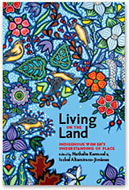 |
Living on the Land: Indigenous Women's Understanding of Place Edited by Nathalie Kermoal and Isabel Altamirano-Jiménez (Political Science) Athabasca University Press, 2016 Living on the Land examines how patriarchy, gender, and colonialism have shaped the experiences of Indigenous women as both knowers and producers of knowledge. From a variety of methodological perspectives, contributors to the volume explore the nature and scope of Indigenous women's knowledge, its rootedness in relationships both human and spiritual, and its inseparability from land and landscape. From the reconstruction of cultural and ecological heritage by Naskapi women in Québec to the medical expertise of Métis women in western Canada to the mapping and securing of land rights in Nicaragua, Living on the Land focuses on the integral role of women as stewards of the land and governors of the community. Together, these contributions point to a distinctive set of challenges and possibilities for Indigenous women and their communities. |
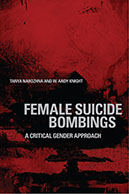 |
Female Suicide Bombings: A Critical Gender Approach Tanya Narozhna and W. Andy Knight (Political Science) University of Toronto Press, 2016 Female Suicide Bombings critically examines and challenges common assumptions of this loaded term. Tanya Narozhna and W. Andy Knight introduce female suicide bombings as a socio-political practice and a product of deeply politicized, gendered representations. Drawing on a combination of feminist and post-colonial approaches as well as terrorism studies literature, the authors seek to transcend ideological divisions in order to enhance our understanding of how gender, power, and academic practices influence our perceptions of female suicide bombings. |
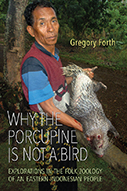 |
Why the Porcupine Is Not a Bird: Explorations in the Folk Zoology of an Easter European Indonesian People Gregory Forth (Anthropology) University of Toronto Press, 2016 This book is a comprehensive analysis of knowledge of animals among the Nage people of central Flores in Indonesia. Gregory Forth's detailed discussion of how the Nage people conceptualize their relationship to the animal world covers the naming and classification of animals, their symbolic and practical use, and the ecology of central Flores and its change over the years. His study reveals the empirical basis of Nage classifications, which align surprisingly well with the taxonomies of modern biologists. It also shows how the Nage employ systems of symbolic and utilitarian classification distinct from their general taxonomy. A tremendous source of ethnographic detail, Why the Porcupine Is Not a Bird is an important contribution to the fields of ethnobiology and cognitive anthropology. |
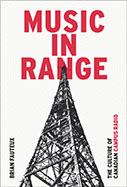 |
Music in Range The Culture of Canadian Campus Radio Brian Fauteux (Music) Wilfred Laurier Press, 2015 Music in Range explores the history of Canadian campus radio, highlighting the factors that have shaped its close relationship with local music and culture. The book traces how campus radio practitioners have expanded stations from campus borders to sur-rounding musical and cultural communities by acquiring FM licenses and establishing community-based mandates. |
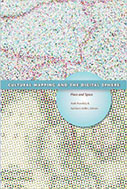 |
Cultural Mapping and the Digital Sphere Place and Space UofA Press, 2015 Ruth Panofsky & Kathleen Kellett, Editors Articles by Susan Brown, Isobel Grundy, Harvey Quaman, Heather Zwicker, Cecily Devereux, and Patricia Demers (all English and Film Studies) This collection of fourteen essays enriches digital humanities research by examining various Canadian cultural works and the advances in technologies that facilitate these interdisciplinary collaborations. Fourteen essays in English or French survey the helix of place and space: While contributors to Part 1 chart new archival and storytelling methodologies, those in Part 2 venture forth to explore specific cultural and literary texts. Cultural Mapping and the Digital Sphere will serve as an indispensable road map for researchers and those interested in the digital humanities, women's writing, and Canadian culture and literature. |
 |
Elizabeth Thompson (Butler), Waterloo Diary: Woman Battle Artist in Training Juvenalia Press, 2015 Edited by Juliet McMaster (Emerita, English and Film Studies) Inspired by a visit to the field of Waterloo, "that inexhaustible battle", and determined to become a painter of battle scenes, young Elizabeth Thompson (later Butler) records her training and the prejudices she faced as a woman painter: until she scores a huge success at the Royal Academy with what Ruskin called "the first fine Pre-Raphaelite picture of battle". |
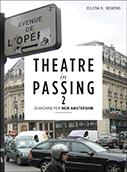 |
Theatre in Passing 2 Searching for New Amsterdam Elena Siemens (Modern Languages and Cultural Studies) Intellect Publishers, 2015 This book discusses spaces of performance from formal opera houses to parks and graffiti around the world and is a companion to Theatre in Passing: A Moscow Photo-Diary. Drawing once again on Michel de Certeau's notion of a 'second poetic geography,' this new volume examines prominent theatrical destinations - New York, London and Paris - along with others that are often overlooked, including Canada, Mexico and Turkey. In addition to indoor theatres, the book covers a variety of outdoor theatrical spaces, as well as street theatre. Like its predecessor, Theatre in Passing 2 is richly illustrated with photographs by the author and provides fascinating insights into the intersection of performing arts, visual culture and photography. |
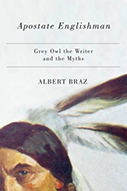 |
Apostate Englishman Grey Owl the Writer and the Myths Albert Braz (English and Film Studies) University of Manitoba Press, 2015 In the 1930s Grey Owl was considered the foremost conservationist and nature writer in the world. He owed his fame largely to his four internationally bestselling books, which he supported with a series of extremely popular illustrated lectures across North America and Great Britain. His reputation was transformed radically, however, after he died in April 1938, and it was revealed that he was not of mixed Scottish-Apache ancestry, as he had often claimed, but in fact an Englishman named Archie Belaney. Born into a privileged family in the dominant culture of his time, what compelled him to flee to a far less powerful one? While the denunciations of Grey Owl after his death are often interpreted as a rejection of his appropriation of another culture, Braz argues that what troubled many people was not only that Grey Owl deceived them about his identity, but also that he had forsaken European culture for the North American Indigenous way of life. That is, he committed cultural apostasy. |
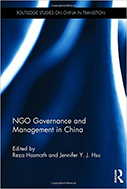 |
NGO Governance and Management in China Edited by Reza Hasmath (Political Science), Jennifer Y. J. Hsu (Political Science) Routledge, 2015 This book provides an urgent insight into contemporary state-NGO relations. It brings together the most recent research covering three broad themes, namely the conceptualizations and subsequent functions of NGOs; state-NGO engagement; and NGOs as a mediator between state and society in contemporary China. The book provides a future glimpse into the challenges of state-NGO interactions in China's rapidly developing regions, which will aid NGOs strategic planning in both the short- and long-term. In addition, it allows a measure of predictability in our assessment of Chinese NGOs behaviour, notably when they eventually move their areas of operation from the domestic sphere to an international one. |
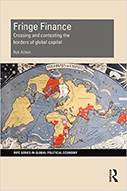 |
Fringe Finance: Crossing and Contesting the Borders of Global Capital Rob Aitken (Political Science) Routledge, 2015 This book places the practices of fringe finance in critical context by situating them within a larger set of discussions in the field. Most importantly, this book is part of a much broader attempt in IPE to rethread the study of finance to questions of cultural and social theory in a meaningful manner. Finance is increasingly subjected to innovative forms of social inquiry influenced by a range of diverse methods including governmentality, actor-network theory and cultural economy. By drawing on several strands of social theory, this book contributes to this broader movement in IPE and helps open more space for the continuation of these interdisciplinary conversations. This work will be of great interest to students and scholars of IPE, development studies and economic sociology. |
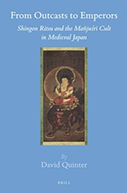 |
From Outcasts to Emperors: Shingon Ritsu and the Mañjuśrī Cult in Medieval Japan David Quinter, (East Asian Studies) Brill Publishers, 2015 In From Outcasts to Emperors, David Quinter illuminates the Shingon Ritsu movement founded by the charismatic monk Eison (1201-90) at Saidaiji in Nara, Japan. The book's focus on Eison and his disciples' involvement in the cult of Mañjuśrī Bodhisattva reveals their innovative synthesis of Shingon esotericism, Buddhist discipline (Ritsu; Sk. vinaya), icon and temple construction, and social welfare activities as the cult embraced a spectrum of supporters, from outcasts to warrior and imperial rulers. In so doing, the book redresses typical portrayals of "Kamakura Buddhism" that cast Eison and other Nara Buddhist leaders merely as conservative reformers, rather than creative innovators, amid the dynamic religious and social changes of medieval Japan. |
 |
Opera in a Multicultural World: Coloniality, Culture, Performance Edited by Mary Ingraham (Music), Joseph So, and Roy Moodley Routledge, 2015 Through historical and contemporary examples, this book critically explores the relevance and expressions of multicultural representation in western European operatic genres in the modern world. It reveals their approaches to reflecting identity, transmitting meaning, and inspiring creation, as well as the ambiguities and contradictions that occur across the time and place(s) of their performance. This collection brings academic researchers in opera studies into conversation with previously unheard voices of performers, critics, and creators to speak to issues of race, ethnicity, and culture in the genre. Together, they deliver a powerful critique of the perpetuation of the values and practices of dominant cultures in operatic representations of intercultural encounters. Essays accordingly cross methodological boundaries in order to focus on a central issue in the emerging field of coloniality: the hierarchies of social and political power that include the legacy of racialized practices. In theorizing coloniality through intercultural exchange in opera, authors explore a range of topics and case studies that involve immigrant, indigenous, exoticist, and other cultural representations and consider a broad repertoire that includes lesser-known Canadian operas, Chinese- and African-American performances, as well as works by Haydn, Strauss, Puccini, and Wagner, and in performances spanning three continents and over two centuries. In these ways, the collection contributes to the development of a more integrated understanding of the interdisciplinary fields inherent in opera, including musicology, sociology, anthropology, and others connected to Theatre, Gender, and Cultural Studies. |